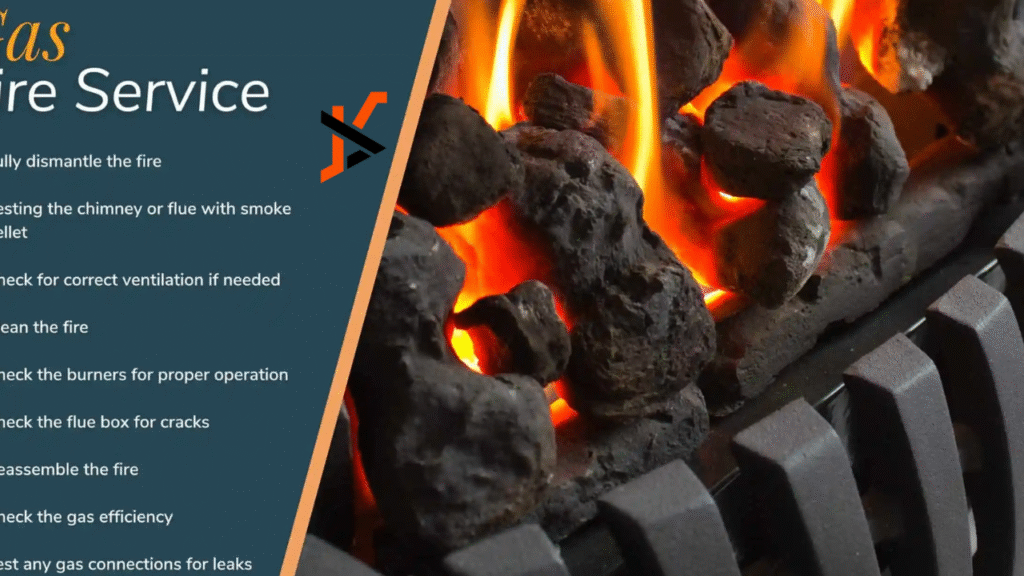Understanding Gas Fire Systems
Gas fire systems are increasingly popular in modern homes due to their efficiency and the warmth they provide. These systems typically use natural gas or propane to generate heat, making them both effective and economical options for home heating. Understanding the components of your gas fire system is crucial for recognizing potential problems and knowing when repairs are necessary.
Key components include:
1. Burner: This is where the gas ignites, producing heat.
2. Thermocouple: A safety device that detects whether the pilot light is lit.
3. Flue: A vent that allows smoke and gases to escape from your home.
4. Control Valve: Regulates the flow of gas to the burner.
Familiarizing yourself with these components can help you identify issues before they escalate into emergencies.
Recognizing Signs of Emergency
Being able to recognize the signs of a gas fire emergency can be lifesaving. Here are some common indicators that immediate action may be required:
1. Unusual Smells: A strong odor similar to rotten eggs is a clear indicator of a gas leak, which requires immediate attention.
2. Hissing Sounds: A hissing noise near your gas lines may indicate a leak or malfunctioning component.
3. Pilot Light Issues: If the pilot light frequently goes out or appears yellow instead of blue, this could signal a problem with combustion or ventilation.
4. Smoke or Flames: Any visible smoke or flames outside the normal operation of your gas fire system is an emergency situation.
Being vigilant about these signs can prevent dangerous situations and ensure your home remains safe and cosy.
Safety First: Immediate Actions
When faced with a gas fire emergency, your first priority should always be safety. Follow these steps:
1. Evacuate the Area: Ensure all occupants leave the house immediately.
2. Turn Off the Gas Supply: If it is safe to do so, turn off the gas supply at the main valve.
3. Do Not Use Electronics: Avoid using light switches or any electronic devices, as they may create sparks.
4. Call Emergency Services: Contact local emergency services or a professional repair service like Plumbing Force to assess the situation.
These immediate actions can significantly reduce risks and protect lives during a crisis.
Common Gas Fire Issues
Understanding common issues that can arise with gas fires can help you prepare for potential emergencies:
1. Gas Leaks: Often caused by damaged pipes or fittings, leaks pose serious risks and must be addressed immediately.
2. Faulty Thermocouples: A malfunctioning thermocouple can lead to an inability to keep the pilot light lit, resulting in heating loss.
3. Clogged Burners: Dirt and debris can clog burners, leading to uneven heating and potential hazardous situations.
4. Ventilation Problems: Blocked vents can cause toxic fumes to accumulate indoors, posing health risks.
By being aware of these issues, homeowners can take proactive measures for maintenance and repairs.
Engaging Professional Help
While some minor repairs may be manageable for homeowners, many situations require professional expertise. Engaging a qualified technician ensures that repairs are conducted safely and effectively.
When selecting a professional service, consider:
1. Licensing and Certification: Ensure that any technician you hire is licensed and certified in gas line work.
2. Experience: Look for professionals with substantial experience in handling gas fire systems specifically.
3. Reputation: Online reviews and recommendations from friends or family can guide you towards reputable services like Plumbing Force.
Hiring seasoned professionals guarantees not only effective repairs but also peace of mind during emergencies.
The Role of Regular Maintenance
Preventative maintenance plays a critical role in ensuring your gas fire system operates efficiently and safely over time. Regular inspections can help catch potential problems before they escalate into emergencies.
Consider implementing these maintenance practices:
1. Annual Inspections: Schedule annual inspections with qualified professionals to ensure everything is functioning correctly.
2. Cleaning Burners: Keep burners clean from debris to avoid clogs and ensure efficient burning.
3. Check Ventilation: Regularly inspect vents for blockages that could lead to poor air quality indoors.
4. Monitor Pilot Lights: Routinely check that pilot lights are burning blue; yellow flames indicate improper combustion.
Consistent maintenance not only extends the life of your system but also enhances safety for everyone in your home.
How Plumbing Force Can Assist
When navigating emergency repairs or routine maintenance for your gas fire system, having reliable assistance is invaluable. Plumbing Force specializes in emergencies related to gas fires, offering quick response times and expert technicians trained specifically for such scenarios.
Their services include:
1. 24/7 Emergency Repairs: Available around-the-clock for urgent situations.
2. Comprehensive Inspections: Detailed assessments that identify potential safety concerns before they become issues.
3. Expert Consultations: Knowledgeable advice on maintaining your system efficiently.
Utilizing services from Plumbing Force ensures that your home remains safe while providing warmth during colder months.
Preparing for Future Emergencies
Being prepared for future emergencies involves creating a comprehensive plan tailored to your household’s needs:
1. Emergency Contacts List: Keep a list of important contacts readily accessible, including local emergency services and trusted repair companies like Plumbing Force.
2. Safety Equipment: Invest in smoke detectors and carbon monoxide detectors, ensuring they are functioning properly at all times.
3. Family Plan: Develop an emergency plan with all members of the household discussing what steps to take in case of an emergency involving gas fire systems.
4. Regular Drills: Conduct regular drills with family members so everyone knows how to respond swiftly during an actual emergency.
Being proactive about preparation enhances safety and creates a sense of security within your home environment.
In summary, understanding how to address gas fire emergencies equips homeowners with the knowledge needed to ensure their homes remain cosy while prioritizing safety above all else. By recognizing signs of trouble early, engaging professional help when necessary, maintaining equipment regularly, and preparing for future situations, individuals can create not just comfort but also peace of mind in their living spaces without compromising safety standards.

